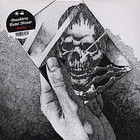In hindsight, it’s crystal clear that last year’s Returnal by Oneohtrix Point Never served as a crucial impulse for electronic music (especially from the U.S.) in 2011. It was him, who re-animated the synthesizer as a source for multifaceted sounds. For this approach, the American writer Philipp Sherburne praised the album highly and underlined the connection to Ambient, »Kosmische Musik«, Tangerine Dream and Klaus Schulze, only to finally emphasize that »it also sounds unusually original, which is a word you don’t get to use often«. Not only because Sherburne wrote these lines, but mainly because he wrote them for Pitchfork, the ground for this equally backward and contemporary music was paved and raised awareness amongst music-nerds in the U.S. and (although with considerable less vehemence) in Europe. But it can’t have been those few lines breaking the spell on this music – instead, Daniel Lopatin a.k.a. Oneohtrix Point Never has touched the Zeitgeist with this simultaneously nostalgic yet progressive sound, directed forwards and backwards at the same time. It evokes memories in those who inevitably grew up with synthesizer-sounds in the 80s. This year, together with Joel Ford, he recorded this impulse under the name of Ford & Lopatin. So did M83 (in a somewhat kitschy transfiguration), Com Truise (broadened and vulcanized by beats) or the label Spectrum Spools (through exalted sound-experiments on the synths). Artistically, Lopatin is closest to the latter – since his early childhood, he has been exploring his Roland Juno-60. Now he’s presenting yet another confrontation with that very device. And even though Replica cannot be certified its predecessor’s visionary quality, it is still worth listening to. While Lopatin used to work on mostly keyboard- and synth-oriented prog-stuff and thereby liberated it from its negative connotations, he is now using commercials, documentaries and educational movies from the 80s – sources which appear to be even more creepy. From those snippets, Lopatin creates a dark and more accelerated sound, and is also more variable in his working-methods, using samplers, analog filtering, tape-manipulation, pianos, glitch, sub-freuquences, even beats. And he cuts or stretches voices to cut-ups or echoes from beyond. Unfortunately, this versatility pays its price: where Returnal captivated by its congruency and its tight compositions, some tracks on Replicaseem to be not thought all the way through, sometimes too sketchy and the overall picture remains undecided and vague. Still, one impression remains: if Lopatin manages to combine this versatility with convincing compositional depths, we can definitely expect something great in the near future.

Replica

